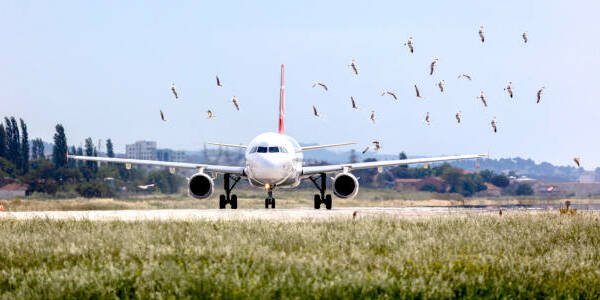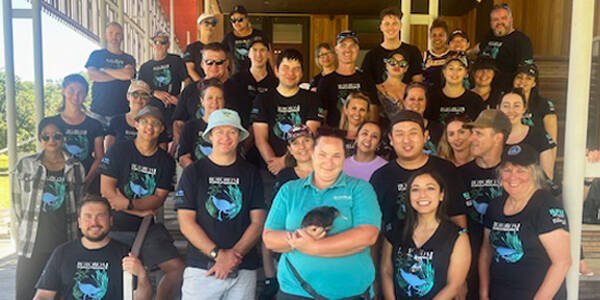The Pinnacle

Stay on top of our fast-moving industry.
Get The Pinnacle delivered direct to your inbox.
Issue 48 (March 2023)
Off to a flyer
I trust you have enjoyed your break and start to 2024.
As the end of a long hot summer approaches, we’re off to a flying start. Refreshed and refocused, we’re looking forward to the year ahead and some of the challenges. Our recent acquisition by the Howden Group puts us in great shape and we look forward to sharing this positivity with clients. A recent highlight for our team was our 13th working bee on Rotora Island and you can read more below, We also share the implications of the Red Sea conflict for NZ business and once again highlight the importance of training following the death of a port stevedore and the injury to an airport employee. Finally, we share some tips for safe Li-ion battery use – which is a growing risk.
Best regards James.
Red warnings from the Red Sea
New Zealand may be a long way away from the conflicts in the Middle East but the attacks on shipping in the Red Sea by Houthi rebels are already affecting our import and export trade. These look likely to only increase in 2024 with delays in shipping and rises in freight costs.
Port of Auckland fined $561,000
The landscape of insurance costs is undergoing a noticeable transformation this year, and while inflation certainly plays a part, attributing the entire shift solely to inflation would be an oversimplification. Several factors, including weather patterns, global reinsurer adjustments, supply chain disruptions, regulatory modifications, and yes inflation, has culminated in a simultaneous impact on insurance expenses.
Severe hand injury resulting from lack of training leads to EU with Auckland Airport
Auckland International Airport Limited (AIAL) has had an enforceable undertaking (EU) accepted by WorkSafe after a worker lost the tips of two fingers and sustained a palm laceration when firing a pyrotechnic launcher to frighten geese from the airport’s runway.
The victim was a member of the wildlife team at the airport. WorkSafe found that the victim did not receive adequate training on the safe use of the launcher and the storage and handling of the cartridges. WorkSafe also found standard operating procedures relating to pyrotechnics were not as they should be.
The regulator commented that training can be ‘watered down’ if it is simply passed on by person to person and not directly linked back to what the best practice states and the law requires. Passing down knowledge without having check-ins can mean gaps in information open up.
Romancing the Rotoroa
Each summer, the Apex team swaps computers for tools and our office becomes Rotoroa Island, just off the coast of Auckland.
Valentine's Day marked our 13th anniversary of helping the island's staff maintain and care for its native flora and fauna, and love was in the air as we celebrated this milestone by releasing five pēpē (baby) kiwis, including one named Apex, in honour of our 13 years of commitment to the island's conservation efforts.
Our hard work in the sun is rewarded by the flourishing wildlife in its native habitat. While cleaning up the tracks to Church Bay, we encountered Saddleback and Weka, witnessing the thriving ecosystem we've contributed to over the years. Sadly, Glen and Milly, Rotoroa's caretakers move on next year. While we'll miss their warm greetings and hospitality, the commitment they've brought to their roles and the knowledge passed on to the Apex team will stay with us.
We highly recommend a visit to Rotoroa Island, our special place. And when you're there, keep an eye out for Apex!
While Li-ion batteries are light, compact, and long-lasting, they can be a fire hazard if damaged, mishandled, or improperly disposed of. More info can be found below
Li-ion batteries have a bite
In the last 12 months two fires caused by Lithium Ion Batteries (Li-ion) caused substantial losses. One fire was caused by a vape device left charging on the bed and the other due to a battery-powered tool left charging overnight. We are seeing this trend only increasing since lithium-ion (Li-ion) With Li-ion batteries everywhere, from e-bikes and e-scooters to vapes and power tools, the risk of fires is only going to increase. Here are some quick safety tips for Li-ion batteries:
Only use the charger specifically designed for the battery. For example, if you have an Apple iPhone or Samsung Galaxy, only use chargers that have been produced by Apple and Samsung
When charging items such as laptops, gaming consoles, cellphones or vapes, do not place them on soft surfaces and never sleep with the item close to you (e.g. under pillows or bedding)
Do not overcharge the battery by leaving it unattended for a prolonged period of time
Keep an eye on the battery while it is in use and remove it immediately if it starts to feel hot
Avoid exposing Li-ion batteries to extreme temperatures, and do not puncture, crush, or otherwise damage the battery casing
Do not dispose of batteries in household waste – they need to be disposed of carefully. You can contact your local council for a recycling location
Follow the manufacturer's guidelines for proper use, storage, and disposal of Li-ion batteries
Care should be taken with the treatment of chargers and charging cables – regularly check cables for signs of wear such as loose plugs, exposed wires, or breaks
Store Li-ion batteries in a cool, dry place and keep them away from moisture and flammable materials
Do not use damaged or visibly degrading Li-ion batteries and dispose of them properly
When charging items in a garage or workshop, keep batteries away from flammables and areas where they could get damp
More info can also be found here: https://www.fireandemergency.nz/home-fire-safety/home-fire-hazards/lithium-ion-battery-safety/

Stay connected with Apex.
Join our LinkedIn community.
Ride Kevin, ride!
After multiple full Ironman triathlons, Kevin Campbell has embarked on a new challenge for his charity, Hospice NZ. He’s riding the Tour Aotearoa Brevet, a self-supported ride held every year and one of the world’s great bike-packing trips.
A Brevet is not a race but rather a ride following a self-course via 30 photo checkpoints. Covering 3,000kms, the route starts at Cape Reinga and follows a combination of cycle trails, tracks, and lanes connected by the most enjoyable country roads and ending at the Bluff.
Over 238 riders are participating in this year’s Tour Aotearoa with Kiwis joined by riders from Canada, the USA and UK, Germany, France and Australia.
Kevin’s trip started on Sunday 18th Feb and he plans to finish on Sunday 10th March. So far, he has covered 741 km and is near Lake Taupo.
The time and effort put into planning the trip takes days but is totally worth it. With all his efforts going to charity, Kevin is a true Apex ambassador, and we wish him all the very best as we track his progress enroute.
Follow Kevin’s progress at his blog linked here.
Previous Issues
Sign up to receive The Pinnacle direct to your inbox here
Join our LinkedIn Community
Follow us on Facebook
Disclaimer
This publication has been prepared for your general information. While all care has been taken in the preparation of this publication, no warranty is given as to the accuracy of the information and no responsibility is taken for any errors or omissions.
This publication does not constitute financial or insurance, or home loan product advice. It may not be relevant to individual circumstances. Nothing in this publication is, or should be taken as, an offer, invitation, or recommendation to buy, sell, or retain any insurance product or make any deposit with any person. You should seek professional advice before taking any action in relation to the matters dealt within this publication.
No part of this publication may be reproduced without prior written permission from our company. A disclosure statement is available on request and free of charge.








